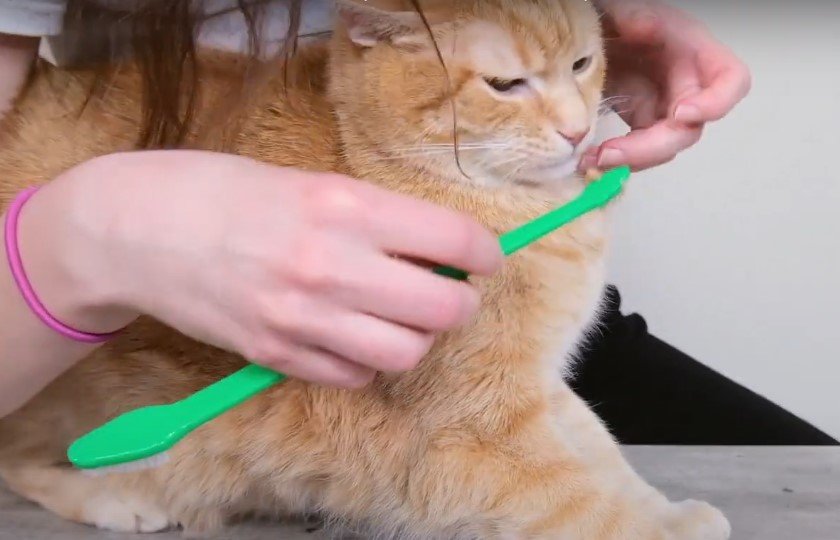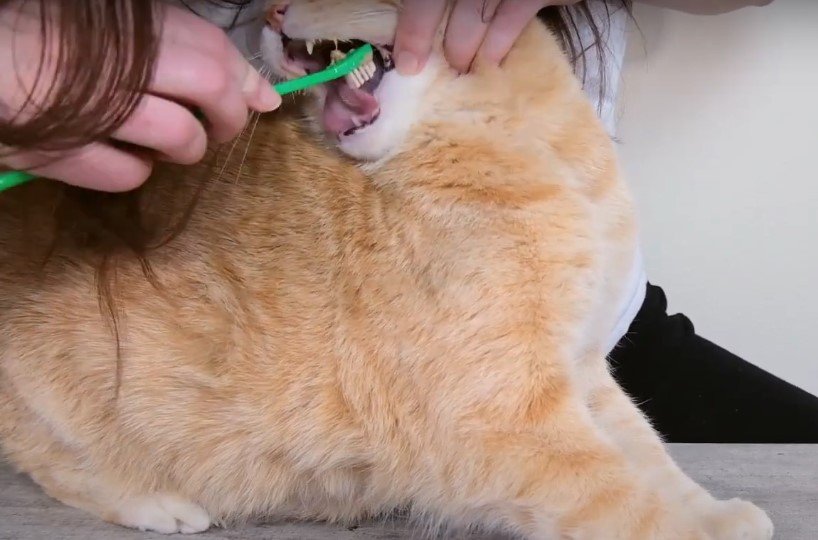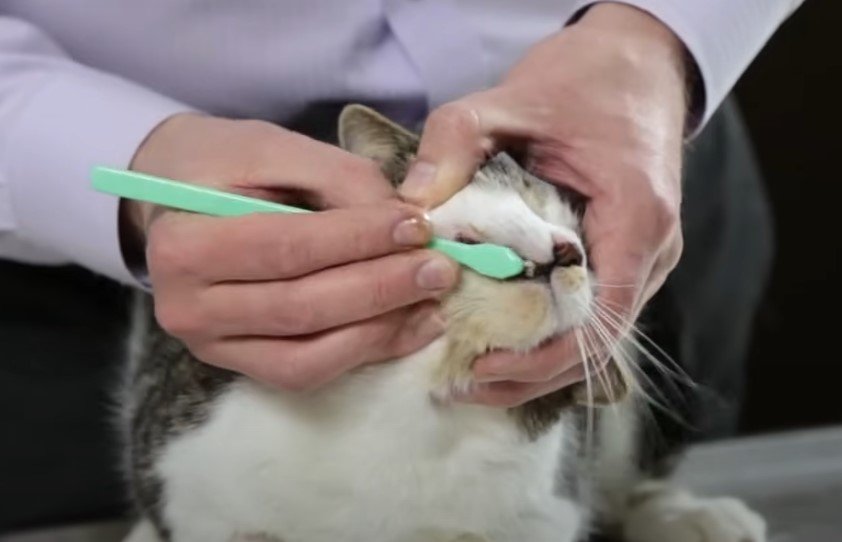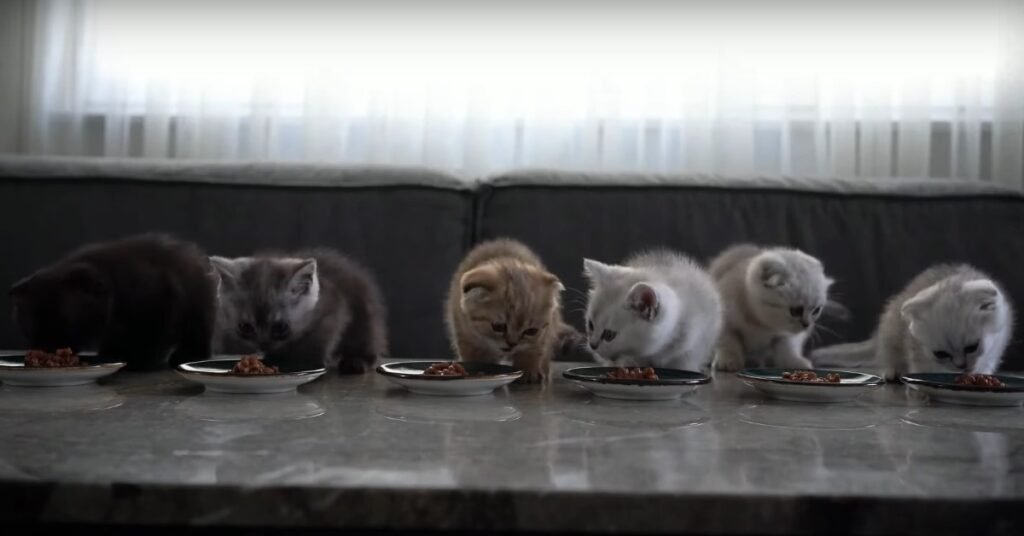
Many pet owners wonder if cleaning their senior cat’s teeth is safe. The answer is yes, it’s generally safe, but there are some important risks, such as anesthesia risks, stress, slow recovery, fragile teeth, jaw fractures, post-procedure pain, and hidden health problems.
Keep reading to know the real risks of teeth cleaning in cats and how to make the process safer. Also, you’ll see the importance of teeth cleaning for cats, especially older cats, and alternative ways to maintain your senior cat’s oral health.
What are the risks of teeth cleaning in older cats?
Teeth cleaning is important for older cats to keep them healthy. However, it can be risky because senior cats may have hidden health problems. Here are the main risks you should know about:
1. Anesthesia Risks
Older cats are more vulnerable to anesthesia-related complications due to weakened heart, liver, and kidney function. Older cats take longer to recover from anesthesia because their bodies process it more slowly. This increases the risk of side effects or complications.
Potential Complications
- Respiratory distress – Anesthesia can cause breathing difficulties, especially in cats with lung disease.
- Hypotension (low blood pressure) can reduce oxygen supply to vital organs, leading to complications.
- Kidney stress – Anesthesia affects blood flow to the kidneys, which is particularly dangerous for cats with early-stage kidney disease.
- Delayed recovery – Older cats may take longer to wake up and regain full coordination.
How to Reduce the Risk
- Do blood tests before the procedure. This will check your cat’s kidney, liver, and heart health and ensure the safety of anesthesia.
- Use IV (Intravenous) fluids during the procedure – This helps keep blood pressure stable and supports healthy kidney function.
- Choose the right anesthesia – Short-acting, easily reversible anesthetics are safer for seniors.
2. Hidden Health Issues That Increase Risk
Many senior cats have undiagnosed conditions that can complicate dental procedures.
Common Health Concerns
- Chronic Kidney Disease (CKD) – 30-50% of senior cats have CKD, which can worsen with anesthesia.
- Heart Disease – Hypertrophic Cardiomyopathy (HCM) is common in older cats and can lead to sudden cardiac complications during anesthesia.
- Diabetes can cause delayed healing and increase the risk of post-procedure infections.
- Hyperthyroidism affects metabolism and increases sensitivity to stress.
How to Reduce the Risk
- Cardiac screening (ECG, ultrasound) for cats with murmurs or suspected heart issues.
- Kidney function tests (SDMA, BUN, creatinine) to assess risk before anesthesia.
- Blood pressure monitoring during the procedure to prevent sudden drops.
3. Fragile Teeth and Jaw Fracture Risks
Long-term dental disease can make a senior cat’s teeth and jawbones weaker. This makes tooth extractions harder and increases the chance of fractures.
Potential Complications
- Jaw fractures – Older cats, especially breeds like Siamese and Burmese, have delicate jaws that can break during tooth removal.
- Tooth root fractures – If the tooth root breaks, it can cause infections or painful abscesses.
- Severe gum recession – Gums pull away from the teeth, exposing the roots and causing pain and sensitivity.
How to Reduce the Risk
- Take full-mouth dental X-rays – This helps the vet find weak bones or hidden problems before the procedure.
- Use gentle extraction methods – This reduces the chance of breaking fragile teeth or jawbones.
- Manage pain after the procedure – Proper pain relief helps your cat eat and recover more comfortably.
4. Risk of Post-Procedure Infections & Complications
Older cats have weak immune systems, so they are more likely to get infections and take longer to heal after dental treatments.
Potential Complications
- Bacteremia (bacteria in the bloodstream) – Can spread infection to the heart (endocarditis) or kidneys.
- Gingival inflammation – If bacteria enter open gum tissue, it can cause painful swelling and infections.
- Refusal to eat – Some cats stop eating due to pain, leading to rapid weight loss.

How to Reduce the Risk
- Give antibiotics before the procedure – This helps protect cats with weak immune systems or existing infections.
- Feed soft food after the procedure – Soft food is easier to eat and gentler on healing gums.
- Watch for warning signs. Check for swelling, bad breath, or drooling, which could indicate an infection.
5. Stress & Recovery Challenges
Senior cats handle stress poorly, and the stress from dental cleaning can cause behavior changes or even health problems.
Potential Complications
- Disorientation and anxiety – Some older cats may stay confused or anxious after anesthesia.
- Pain-related aggression – Even calm cats might become cranky or aggressive if they’re in pain.
- Loss of appetite—Some cats may stop eating for several days, which can lead to serious liver problems, such as hepatic lipidosis (fatty liver disease).
How to Reduce the Risk
- Use pain management medications to keep the cat comfortable.
- Keep them in a quiet, familiar space after returning home.
- Encourage hydration and small, frequent meals post-procedure.
The Importance of Teeth Cleaning for Cats
Regular teeth cleaning is key to keeping your cat healthy and happy. Many cat owners ignore dental care, but 70% of cats over 3 years old have dental issues. Without regular cleaning, plaque turns into tartar, causing infections, pain, and even damage to vital organs. Here are some key benefits of regular teeth cleaning:
Prevents Gum Disease
Stops plaque buildup, reducing the risk of gingivitis and periodontitis.
Avoids Pain and Tooth Loss
Keeps teeth strong and prevents painful infections.
Protects Internal Organs
Prevents bacteria spreading from the mouth to the heart, liver, and kidneys.
Eliminates Bad Breath
A clean mouth keeps your cat’s breath fresh.
Saves on Vet Costs
Preventing dental disease is more affordable than treating them.
What Happens If You Don’t Clean Your Cat’s Teeth?
Ignoring your cat’s dental health can lead to serious problems:
- If plaque is not removed, it turns into hard tartar, which can’t be brushed away and may cause infections.
- Gingivitis causes red, swollen gums that bleed easily. This makes it painful.
- Periodontal Disease, a severe gum infection, that damages teeth and can lead to tooth loss.
- Tooth Abscesses are deep infections around the tooth root that cause swelling, pain, and difficulty eating.
- Bacteria from the mouth can enter the bloodstream. This can affect the heart, liver, and kidneys.
Cautions: Dental disease doesn’t just affect your cat’s mouth—it can impact their overall health and even shorten their lifespan.
How to Clean Your Cat’s Teeth at Home
Cats need professional teeth cleaning by a vet to prevent dental disease. However, you can brush your cat’s teeth at home using a cat-safe toothbrush and toothpaste.
Daily brushing is the best way to keep your cat’s teeth clean. Start slow and be patient. Here is a step-by-step guide to follow:
1. Choose the Right Tools – Use a cat-specific toothbrush and vet-approved toothpaste. Never use human toothpaste.
2. Get Your Cat Comfortable – Let them taste the toothpaste first. Use treats or praise as a reward.
3. Gently Brush in Circles – Clean the outer surfaces of the teeth and gums.
4. Start with Short Sessions – Even 30 seconds is better than nothing. Gradually increase time.
5. Be Consistent – Aim for at least 3–4 times per week for the best results.
Alternative Ways to Keep Your Cat’s Teeth Clean
Not all cats tolerate brushing. If your cat refuses to be brushed, there are alternative options. Here are other effective methods:
Dental Diets & Treats – Special kibble helps clean your cat’s teeth, preventing plaque accumulation and supporting overall dental health.
Water Additives – When added to your cat’s water, these help remove harmful bacteria, keep their breath fresh, and promote healthy teeth and gums.
Dental Gels & Sprays – These products are applied directly to the teeth to break down plaque and prevent tartar formation.
Chew Toys – Cleans teeth while your cat chews.

When to See a Vet for Professional Teeth Cleaning
Even with at-home care, cats need professional dental cleanings to remove deep tartar and check for hidden problems. Here are some signs your cat needs a vet dental Checkup:
- Bad breath that smells rotten.
- Drooling or pawing at the mouth.
- Trouble eating or dropping food.
- Red, swollen, or bleeding gums.
- Loose or missing teeth.
How Do Cats Develop Dental Problems?
Cats can get dental problems from plaque, gum infections, and other health issues. It’s common but often overlooked. By the time you see signs, the damage could be severe.
1. Plaque and Tartar Build-Up
Food particles and bacteria stick to the teeth and form plaque. In just a few days, plaque hardens into tartar, which is more difficult to clean. Tartar irritates the gums, leading to swelling and infections. Without proper care, this can lead to serious dental issues.
How It Happens:
- Food particles and bacteria mix with saliva.
- Plaque forms and sticks to the teeth.
- Minerals in saliva turn plaque into tartar.
- Tartar spreads under the gums, causing disease.
2. Gingivitis: The First Stage of Gum Disease
Gingivitis is the first stage of gum disease. Plaque and tartar damage the gums, leading to gingivitis. Red and swollen gums, bleeding when eating or chewing, bad breath are signs of gingivitis.
3. Periodontal Disease
Gingivitis turns into periodontal disease if untreated, where bacteria spread below the gumline. This damages the bone and ligaments that hold teeth in place. Over time, teeth become loose, causing pain and difficulty eating. Bacteria from infected gums can also enter the bloodstream, affecting vital organs like the heart, liver, and kidneys. Did you know that by the age of 3, 70% of cats already show signs of periodontal disease?
4. Tooth Resorption
Tooth resorption is another common problem, affecting up to 75% of cats over five years old. In this painful condition, the cat’s body breaks down its teeth. While the cause is unclear, affected teeth become weak and may break. Cats with tooth resorption may avoid hard food, drool more, or paw at their mouths. Often, extraction is the only solution.
5. Broken or Fractured Teeth
Cats can break their teeth by chewing hard objects or due to injury. Once the tooth is exposed, bacteria can infect the root, causing abscesses and severe pain.
6. Bad Diet and Lack of Dental Care
Diet and poor dental care greatly affect cats’ oral health. Wet food allows plaque to build faster. Without brushing, dental treats, or vet cleanings, plaque leads to disease.
FAQs on Risks of Teeth Cleaning in Older Cats
1. When is a Cat Too Old for Dental Teeth Cleaning?
A cat is not too old for dental cleaning if it is healthy. The main risk is anesthesia, not age. Vets check the heart, kidneys, and overall health before cleaning. If a cat has serious health problems, cleaning may be too risky. Regular home care can help avoid the need for cleaning in old cats.
2. What Are the Advantages of Having Cats’ Teeth Cleaned?
Teeth cleaning prevents dental problems, improves breath, and lowers the risk of serious diseases. It also reduces the chances of chronic conditions like heart and kidney issues. Regular cleanings help detect and fix hidden problems early, keeping your cat healthy and pain-free.
3. What Are the Disadvantages of Having Cats’ Teeth Cleaned?
Teeth cleaning needs anesthesia, which can be risky for older or sick cats. It may cause stress, sleepiness, or less eating for a while. The procedure is costly and may require removing bad teeth, which can be painful.
4. Can dental problems cause weight loss in older cats?
Yes, dental problems can cause weight loss in older cats. Gum disease, tooth decay, or infections can make chewing painful, so they may eat less. If your cat is losing weight and has these issues, it’s best to see a vet. You can also check out this article: How to Help a Senior Cat Gain Weight.
Final overview
A healthy mouth keeps your senior cat happy and strong. Dental care may have risks, but with the right steps, it remains safe. Regular checkups, gentle cleaning, and smart choices help prevent pain and problems. A little care today means a healthier, longer life for your cat.

